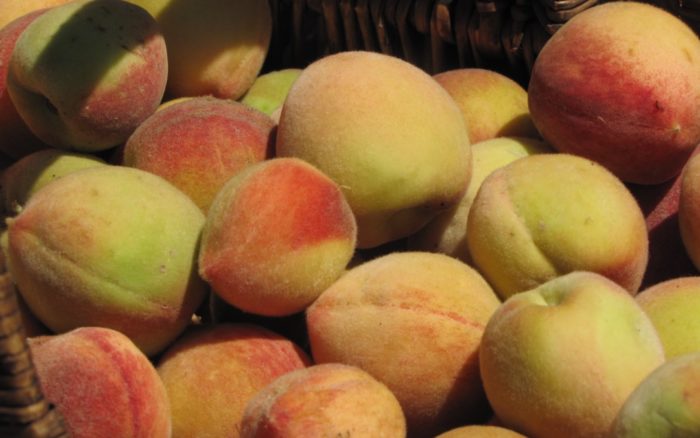Peaches and Memories
I didn’t expect for us both to end up in tears. I only meant for him to sign his broadsides that I had just bought for my brother, sisters, and me, a gift to commemorate the sale of our four generation family farm. The broadside, entitled We Farm Memories, hit a particularly poignant note.
David Mas Masumoto is a peach farming poet who read his work at a Geography of Hope conference held in Point Reyes some years ago. Most memorable was a poem story of his father bringing his grandparents to the land upon which his family now farms organic heritage peaches. His grandparents were reluctant to reconnect to land after being removed to the Japanese internment camps during the Second World War, causing them to lose everything. As Masumoto read, his daughter punctuated his words with the reverberating, deep beats of a Taiku drum.
His broadside is about peaches, memory, and stories. “A great peach can transport us to someplace else” it reads, ” the memory of a tree in a backyard, thoughts of family in summer kitchens canning or making jams…”
I was transported to the white peach tree just north of the summer kitchen in my multi-generational family’s backyard. Each summer my father waited to pick them until the fruit had just the right firm softness. The flavor ruined you on any other peach in the world. My father picked them carefully, as white peaches bruise easily, and carried them to his mother—in my early childhood—and then his wife, my mother, when my grandmother passed. The tree was old, and the quantity of fruit, scant, but for all of us, the fact of the aging tree only made these white peaches more precious. Eating them was a sacrament.
I had stood in line to get Masumoto’s signatures on all four broadsides that I had just purchased. I started to tell him, “I bought these for my sisters and brother. We just had to sell our family farm, and there was a white peach tree…” and then I could say no more, and I surprised myself by crying. He too… it was one of the moments in life when grief swells into the space of an unexpected encounter with a stranger. It was as if the pure spring of the archetypal process of loss of beloved land sudden flowed. Was this Grace? Tears ran down his cheeks as he took the pen and signed each broadside in silence. We exchanged a sad, knowing smile, and I left.
The end of the broadside reads, “These stories join our meals and create a social connection between places, people and food. With stories, we never eat alone.”
The memory of the white peach tree in what was once my family’s backyard binds us to each other and now, in a larger way, to others who have lost land loved.
